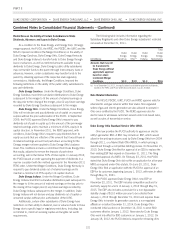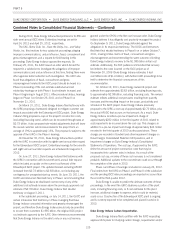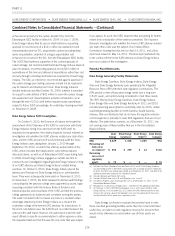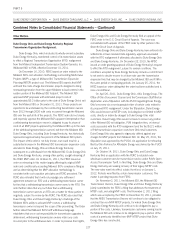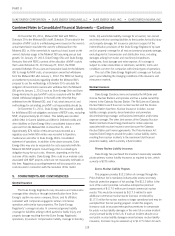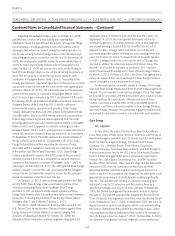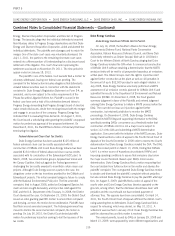Duke Energy 2011 Annual Report Download - page 149
Download and view the complete annual report
Please find page 149 of the 2011 Duke Energy annual report below. You can navigate through the pages in the report by either clicking on the pages listed below, or by using the keyword search tool below to find specific information within the annual report.
PART II
DUKE ENERGY CORPORATION •DUKE ENERGY CAROLINAS, LLC •DUKE ENERGY OHIO, INC. •DUKE ENERGY INDIANA, INC.
Combined Notes to Consolidated Financial Statements – (Continued)
of their licensed reactors, payable at a rate not to exceed $17.5
million a year per licensed reactor for each incident. The assessment
and rate are subject to indexing for inflation and may be subject to
state premium taxes. The Price-Anderson Act provides for an inflation
adjustment at least every five years with the last adjustment effective
October 2008.
Duke Energy Carolinas is a member of Nuclear Electric
Insurance Limited (NEIL), which provides property and accidental
outage insurance coverage for Duke Energy Carolinas’ nuclear
facilities under three policy programs:
Primary Property Insurance.
This policy provides $500 million of primary property damage
coverage, with a $2.5 million deductible per occurrence obligation,
for each of Duke Energy Carolinas’ nuclear facilities.
Excess Property Insurance.
This policy provides excess property, decontamination and
decommissioning liability insurance: $2.25 billion for the Catawba
Nuclear Station and $1 billion each for the Oconee and McGuire
Nuclear Stations. The Oconee and McGuire Nuclear Stations also
share an additional $1 billion insurance limit above their dedicated
$1 billion underlying excess. This shared additional excess $1 billion
limit is not subject to reinstatement in the event of a loss.
Accidental Outage Insurance.
This policy provides business interruption and/or extra expense
coverage resulting from an accidental property damage outage of a
nuclear unit. Each McGuire and Catawba unit is insured for up to
$3.5 million per week, and the Oconee units are insured for up to
$2.8 million per week. Coverage amounts decline if more than one
unit is involved in an accidental outage. Initial coverage begins after a
12-week deductible period for Catawba and a 26-week deductible
period for McGuire and Oconee and continues at 100% for 52
weeks and 80% for the next 110 weeks. The McGuire and Catawba
policy limit is $490 million and the Oconee policy limit is $392
million.
Losses resulting from non-certified acts of terrorism are covered
as common occurrence, such that if non-certified terrorist acts occur
against one or more commercial nuclear power plants insured by
NEIL within a 12 month period, they would be treated as one event
and the owners of the plants where the act occurred would share one
full limit of liability (currently $3.2 billion)
In the event of large industry losses, NEIL’s Board of Directors
may assess Duke Energy Carolinas for amounts up to 10 times its
annual premiums. The current potential maximum assessments are:
Primary Property Insurance — $37 million, Excess Property Insurance
— $43 million and Accidental Outage Insurance — $22 million.
Pursuant to regulations of the NRC, each company’s property
damage insurance policies provide that all proceeds from such
insurance be applied, first, to place the plant in a safe and stable
condition after a qualifying accident, and second, to decontaminate
before any proceeds can be used for decommissioning, plant repair or
restoration.
In the event of a loss, the amount of insurance available might not
be adequate to cover property damage and other expenses incurred.
Uninsured losses and other expenses, to the extent not recovered by
other sources, could have a material effect on Duke Energy Carolinas’
results of operations, cash flows or financial position.
The maximum assessment amounts include 100% of Duke
Energy Carolinas’ potential obligation to NEIL for the Catawba
Nuclear Station. However, the other joint owners of the Catawba
Nuclear Station are obligated to assume their pro rata share of liability
for retrospective premiums and other premium assessments resulting
from the Price-Anderson Act’s excess secondary financial protection
program of risk pooling, or the NEIL policies.
Environmental
Duke Energy is subject to international, federal, state and local
regulations regarding air and water quality, hazardous and solid
waste disposal and other environmental matters. Duke Energy
Carolinas, Duke Energy Ohio and Duke Energy Indiana are subject to
federal, state and local regulations regarding air and water quality,
hazardous and solid waste disposal and other environmental matters.
These regulations can be changed from time to time, imposing new
obligations on the Duke Energy Registrants.
The following environmental matters impact all of the Duke
Energy Registrants.
Remediation Activities.
The Duke Energy Registrants are responsible for environmental
remediation at various contaminated sites. These include some
properties that are part of ongoing operations and sites formerly
owned or used by Duke Energy entities. In some cases, Duke Energy
no longer owns the property. Managed in conjunction with relevant
federal, state and local agencies, activities vary with site conditions
and locations, remediation requirements, complexity and sharing of
responsibility. If remediation activities involve statutory joint and
several liability provisions, strict liability, or cost recovery or
contribution actions, the Duke Energy Registrants could potentially be
held responsible for contamination caused by other parties. In some
instances, the Duke Energy Registrants may share liability associated
with contamination with other potentially responsible parties, and
may also benefit from insurance policies or contractual indemnities
that cover some or all cleanup costs. Reserves associated with
remediation activities at certain sites have been recorded and it is
anticipated that additional costs associated with remediation activities
at certain sites will be incurred in the future. All of these sites
generally are managed in the normal course of business or affiliate
operations.
The Duke Energy Registrants have accrued costs associated
with remediation activities at some of its current and former sites, as
129




